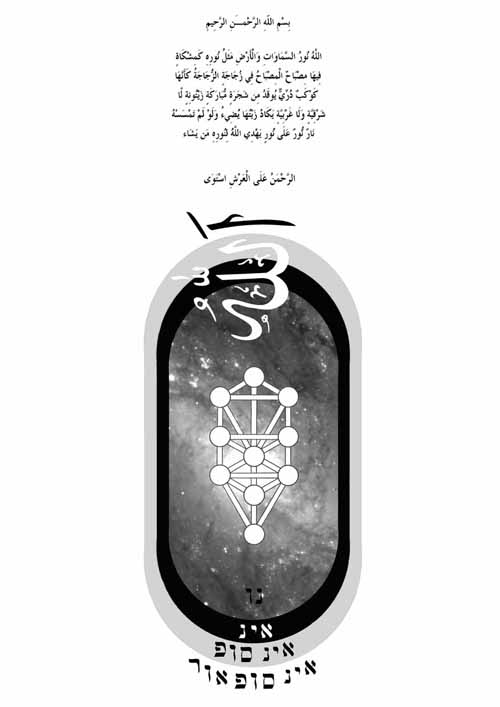Islamic cosmology
(Difference between revisions)
|
Revision as of 18:00, 21 May 2006 Nehustan (Talk | contribs) References |
Revision as of 18:01, 21 May 2006 Nehustan (Talk | contribs) References |
||
| Line 31: | Line 31: | ||
| The Holy Quran, 1992 (1413 H), English Translation of ‘The meanings and commentary’, The Custodian of The Two Holy Mosques King Fahd Complex for the Printing of The Holy Quran, P.O. Box 3561, Al-Madinah Al-Munawarah, K, of S.A.. | The Holy Quran, 1992 (1413 H), English Translation of ‘The meanings and commentary’, The Custodian of The Two Holy Mosques King Fahd Complex for the Printing of The Holy Quran, P.O. Box 3561, Al-Madinah Al-Munawarah, K, of S.A.. | ||
| - | [http://www.islam-qa.com/index.php?ln=eng&ds=qa&lv=browse&QR=27075&dgn=4 The degrees and levels of Paradise and Hell], 2004, Retrieved on 2nd May 2006 from | + | [http://www.islam-qa.com/index.php?ln=eng&ds=qa&lv=browse&QR=27075&dgn=4 The degrees and levels of Paradise and Hell] |
Revision as of 18:01, 21 May 2006
The first ayat to be considered in relation to cosmology is ‘Ayat al Kursi’ (2:255), which may be considered one of the most recited verses of the Quran. Although the word ‘Kursi’ is often translated as ‘Throne’ it is considered more correct in its Quranic context to consider it as ‘footstool’
Allah! There is no god but He, The Living, The Self-subsisting, Supporter of all, No slumber can seize Him nor Sleep. His are all the things in the heavens and on earth. Who is thee can intercede in His presence except as He permitteth? He knoweth what (appeareth to his creatures as) before or after or behind them. Nor shall they compass aught of his knowledge except as He willeth. His Footstool doth extend over the heavens and the earth, and he feeleth no fatigue in guarding and preserving them for He is Most High, The Supreme (in glory). (Quran, Surah 2, Ayat 255)
This when considered in light of modern scientific cosmology (Ar Rahaman At Tarjumana, 1980), could signify that the Footstool extends over the heavens. The ‘heavens’, may indeed be taken to mean our own created universe. If the universe exists, as posited by modern scientific paradigm, as spherical, then the Kursi that extends over it must encompass it. ‘Al-Arsh’ or ‘The Throne’ is considered to lie at an unperceivable distance beyond ‘Al-Kursi’, beyond what is referred to as a sea, and just as the Kursi extends over the creation, so does the Arsh extend over Paradise. Despite being unable to verify this cosmology via scientific method, when asked of the relation between the Kursi and the Arsh;
It is confirmed from Abu Dharr that the Prophet said; “The seven heavens are to the Kursi but like a ring thrown in a desert land. And the superiority of the Arsh compared to that of the Kursi is like the superiority of that desert compared to the ring. (Al-Sa‘di, 2003, p.274, note 147)
‘Firdaws’, the highest part of paradise is described thus,
The highest of the degrees of Paradise is al-Firdaws, as it was narrated that Abu Hurayrah (may Allaah be pleased with him) said: The Messenger of Allaah (peace and blessings of Allaah be upon him) said: “… When you ask of Allaah, ask Him for al-Firdaws, for it is in the middle of Paradise and is the highest part of Paradise, and above it is the Throne of the Most Merciful, and from it spring forth the rivers of Paradise.” Narrated by al-Bukhaari, 2637; Muslim, 2831. (The degrees and levels of Paradise and Hell, Web Resource)
The Quran states that Allah, ‘The Most Gracious is firmly established on the throne.’ (Quran, Sura 20, Ayat 5), and Islamic scholarly edict makes plane the separation between Allah and his creation with Imam `Abd al-Ghani al-Nabulusi renowned statement ‘Whoever believes that Allah permeates the Heavens and the Earth, or that He is a body sitting on His Throne, is a disbeliever, even if he thinks he is a Muslim.’ (Kabbani, 1996, p.86).
References
Al-Sa‘di, A. A., 2003, An explanation of muhammad ibn ‘abd al-wahhab’s Kitab al-tawhid, Al-Hidayat Publishing, Birmingham, U.K..
Ar Rahaman At Tarjumana, A., 1980, The subatomic world in the quran, Diwan Press, Norwich, UK.
Kabbani, M. H., 1996, Islamic beliefs and doctrine according to ahl as-sunna: a repudiation of "salafi" innovations, ASFA, Kazi Publications, Chicago, IL, USA.
The Holy Quran, 1992 (1413 H), English Translation of ‘The meanings and commentary’, The Custodian of The Two Holy Mosques King Fahd Complex for the Printing of The Holy Quran, P.O. Box 3561, Al-Madinah Al-Munawarah, K, of S.A..
The degrees and levels of Paradise and Hell (http://www.islam-qa.com/index.php?ln=eng&ds=qa&lv=browse&QR=27075&dgn=4)
![[Main Page]](http://www.thelemapedia.org/images/logo.gif)
